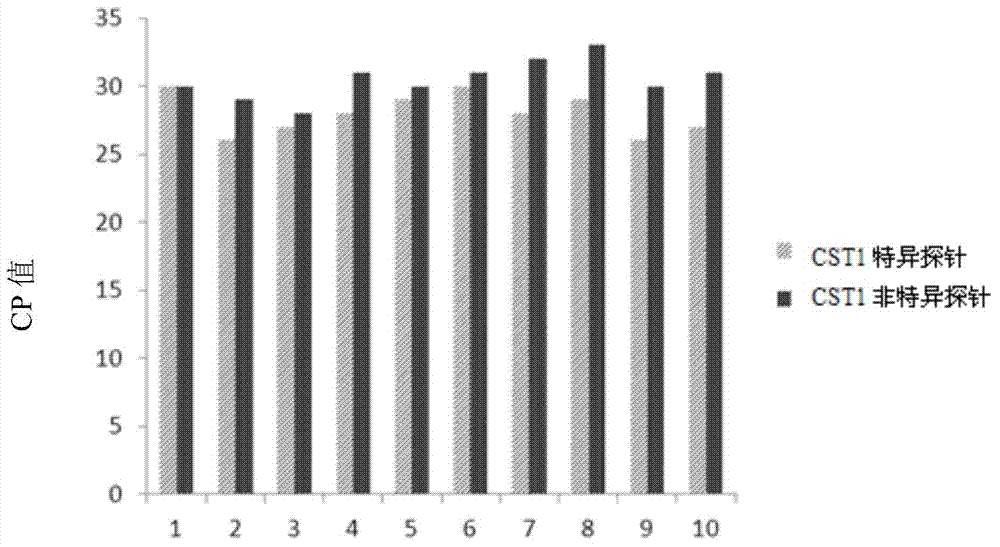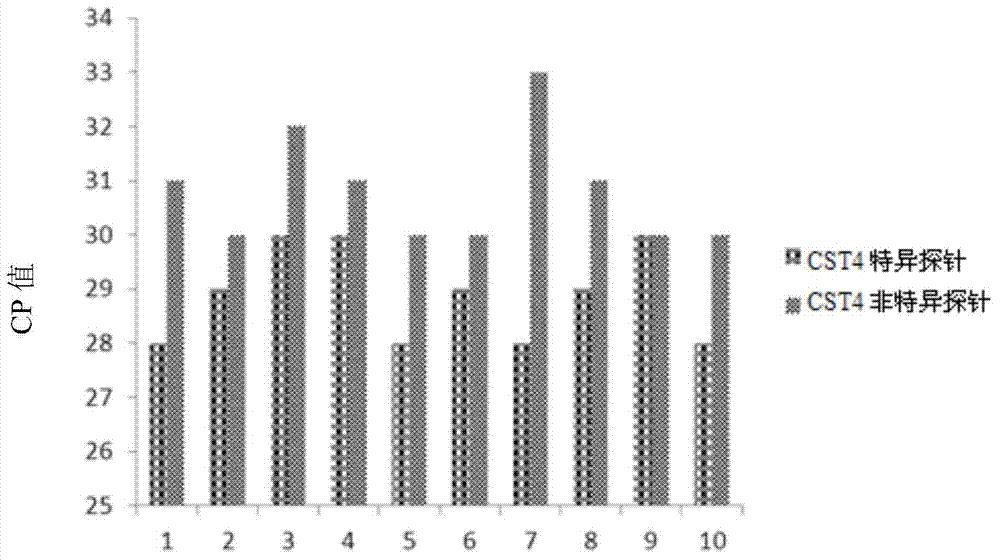Application of CST1mRNA (Cystatin 1 Messenger RNA) and CST4mRNA (Cystatin 4 Messenger RNA)or proteins coded by CST1mRNA and CST4mRNA in preparation of bladder cancer markers and kit thereof
A kit and marker technology, applied in the field of diagnosis, can solve the problems of no bladder cancer correlation, etc., and achieve the effects of reducing sampling pain, good specificity, and convenient use
- Summary
- Abstract
- Description
- Claims
- Application Information
AI Technical Summary
Problems solved by technology
Method used
Image
Examples
Embodiment 1
[0038] Embodiment 1, magnetic bead method specifically enriches the mRNA of CST1, CST4 and SDHA gene from urine
[0039]According to the mRNA sequence design of CST1, CST4 and SDHA, capture the specific probe of CST1, CST4 and SDHA gene mRNA (the nucleotide sequence of CST1mRNA is as shown in SEQ ID NO.1, and the nucleotide sequence of CST4mRNA is as shown in SEQ ID NO.2 , the nucleotide sequence of SDHA mRNA such as SEQ ID NO.3), specifically as follows: the probe for capturing CST1 mRNA is 5'-aaagagcacaactgtttcttctgca (dA) 30-3' (SEQ ID NO.4), and the probe for capturing CST4 mRNA is 5'-taccaggtctattagaagca(dA)30-3'(SEQ ID NO.5), the probe for capturing internal reference gene SDHA (ubiquinone reductase) mRNA is 5'-ggagcgaatggctggcgggacg(dA)30-3'(SEQ ID NO.5). 6), the above-mentioned specific probe can complementarily bind to the olig(dT) of magnetic beads (GE, product number: 3815-2103-010150) to obtain magnetic beads bound to the specific probe.
[0040] Enrich the mRNA o...
Embodiment 2
[0054] Embodiment 2, detecting the expression of CST1 and CST4 in bladder cancer tissue
[0055] 30 cases of bladder cancer and adjacent paired tissue samples were collected from the Urology Department of Shanghai Fifth People's Hospital, cut to the size of rice grains, stored in RNAlater preservation solution at -80°C, and equilibrated to room temperature before use. Then according to the method of Example 1, the CST1mRNA, CST4mRNA and SDHA mRNA of bladder cancer and paracancerous paired tissues were enriched respectively, and then 30 cases of bladder cancer and paracancerous samples were detected with CST1 detection primers, CST4 detection primers and internal reference gene SDHA detection primers respectively. The relative expression levels of CST1 gene and CST4 gene in paired tissues, the detection system and detection conditions are the same as those in Example 1. The test results are 2 -ΔΔCP The relative expression was calculated by the method, and then the ratio (C / N) ...
Embodiment 3
[0056] Embodiment 3, construct bladder cancer detection kit
[0057] 1. Construction of CST1 recombinant plasmid
[0058] The total mRNA of bladder cancer cell line T24 was extracted from bladder cancer cell line T24, and then cDNA was synthesized using the extracted mRNA as a template, and the primers for constructing CST1 recombinant plasmid were designed according to the CST1 gene sequence, and the upstream primer was 5'-ctggagccccaaggagga-3' (SEQ ID NO.13), the downstream primer is 5'-accagtccagggggtggga-3' (SEQ ID NO.14), with the nucleotides shown in SEQ ID NO.13 and SEQ ID NO.14 as primers, the synthetic cDNA is The template was amplified by PCR, and the amplification conditions were: denaturation at 94°C for 5 minutes; 45 cycles of denaturation at 94°C for 30 seconds, annealing at 60°C for 30 seconds, and extension at 72°C for 1 minute; extension at 72°C for 5 minutes, and cooling at 4°C. The amplified product was connected to the pTZ57R vector to construct a CST1 rec...
PUM
 Login to View More
Login to View More Abstract
Description
Claims
Application Information
 Login to View More
Login to View More - R&D
- Intellectual Property
- Life Sciences
- Materials
- Tech Scout
- Unparalleled Data Quality
- Higher Quality Content
- 60% Fewer Hallucinations
Browse by: Latest US Patents, China's latest patents, Technical Efficacy Thesaurus, Application Domain, Technology Topic, Popular Technical Reports.
© 2025 PatSnap. All rights reserved.Legal|Privacy policy|Modern Slavery Act Transparency Statement|Sitemap|About US| Contact US: help@patsnap.com



